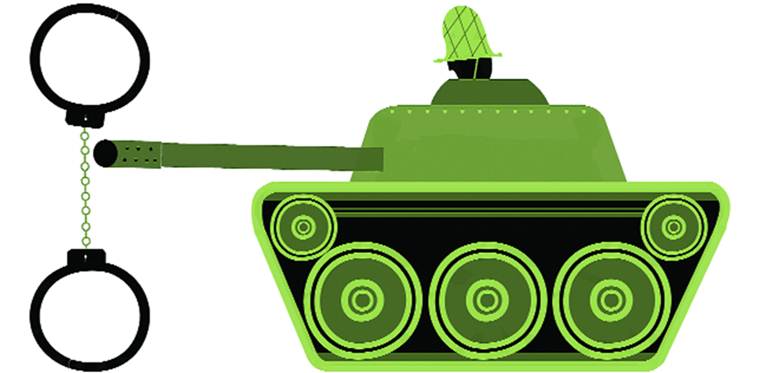Battle at Bomdila
Winning this one is no feather in the cap for the Indian Army.

What, precisely, was the provocation in Bomdila? The fact that two army personnel were arrested for drunken misbehaviour? ( Illustration: CR Sasikumar)
More than five decades after the debacle of 1962, the quaint town of Bomdila is in the news again. But this time the Indian Army is not fighting a foreign adversary. This time, the army is pitted against its own civil authorities, more specifically, the DC and SP of Bomdila. The provocation — the alleged illegal detention of, and misbehaviour with, two army jawans of the Arunachal Scouts by the local police.
First, a brief outline of the incident. On November 2, two army jawans go out into town to attend a Buddha Mahotsav. There they supposedly knock back a few and get into an altercation with locals, including alleged misbehaviour with women. The police arrive and arrest them and take them to the police station. Here, the police are alleged to have beaten them up in custody. Soon after, truckloads of army jawans reach the police station. Thereafter, in a video clip gone viral, the CO of Arunachal Scouts gives a very measured and menacing warning to the local DC/SP about their personal well being. After this show of force, accompanied by a befitting reply to the locals by vandalising the police station and damaging police vehicles, the army jawans are taken away. The izzat of the Indian Army has been restored, and the civilians, especially the thullaas, have been sorted out. This time around, the Indian Army seems to have won a decisive victory at Bomdila.
What, precisely, was the provocation in Bomdila? The fact that two army personnel were arrested for drunken misbehaviour at the behest of local citizens? Or that while effecting the arrest, they were subjected to use of force? An impression is sought to be created that under the CrPC and the respective Acts of the three armed forces, personnel have some kind of blanket immunity from arrest by the police. This is patently false. The police are authorised to arrest armed forces personnel for cognisable offences. The only difference from the arrest of an ordinary citizen is that after arrest and production before a magistrate, the police have to hand over the arrested personnel to army authorities within 24 hours. That is the legal position. As for use of force, if there is a calm and gentle way of arresting two young men fuelled by alcohol and testosterone, I am not aware of it. Judging by accounts in the local press, the army personnel were inebriated and aggressive. If indeed the police misbehaved with the two men in custody, was the response by the army legal, proportionate and justified?
Police high-handedness cannot be justified, but there is a way of dealing with it. The CO could have insisted on action against the police personnel who were accused of misbehaviour. Allowing his men to assault civil and police officers, and destroying government property may make him a hero before his men and the wider community of armed forces veterans and supporters. But it does call into question the attitude of the army about due process. Spewing venom on social media is not going to change the legal position.
The incident involving the two personnel is not that surprising. In garrison towns around the world, it is quite common to see young soldiers go out to let off steam and get involved in bar brawls. Sometimes things escalate and police intervention is required. In most cases, senior officers from the military and the police have a quiet word and the matter is closed. Or if the army authorities feel that they have been wronged, they file a complaint. That didn’t happen here. Here the CO of the unit allowed his men to rough up civilians and police personnel and destroy government property while he sat in a civil office threatening the DC/SP. As an officer who swears an oath to the Constitution of India, his behaviour shows contempt for both due process and the rule of law. While I respect his protective sentiments towards the men under his command, there was no need to threaten the civil authorities.
The incident involving the two personnel is not that surprising. In garrison towns around the world, it is quite common to see young soldiers go out to let off steam and get involved in bar brawls. Sometimes things escalate and police intervention is required. In most cases, senior officers from the military and the police have a quiet word and the matter is closed. Or if the army authorities feel that they have been wronged, they file a complaint. That didn’t happen here. Here the CO of the unit allowed his men to rough up civilians and police personnel and destroy government property while he sat in a civil office threatening the DC/SP. As an officer who swears an oath to the Constitution of India, his behaviour shows contempt for both due process and the rule of law. While I respect his protective sentiments towards the men under his command, there was no need to threaten the civil authorities.
Civil-military relations are tricky business even in more mature democracies. In a country like India where till Independence, the army was the backbone of colonial rule, and was suitably rewarded for it by an exalted status, they are a veritable minefield. Post-Independence, the army feels with some justification that it has been downgraded vis-a-vis civil authorities. And when they compare their position with their counterparts in Pakistan and China, this grievance turns into a howl of rage. It is this sentiment we see being expressed in various ways, from contempt to outright hostility over a whole range of issues related to pay, pensions and protocol. In the worldview of the armed forces, the politicians are stupid, the bureaucracy is conniving and the police are irredeemably corrupt. Only the Indian Army stands firm as a paragon of public virtue. It is almost as if the army wants us to believe that it is somehow better than the country it serves. While a certain amount of myth-making is integral to the ethos of a modern professional army, it would be nice if the myth is at least partially anchored in reality.
From corruption allegations in recruitment to procurement, from court cases over promotions to allegations of sexual harassment of junior officers’ wives by senior officers, our forces face a whole spectrum of controversies that is not much different to those faced by other institutions of our country, especially the police. And yet, somehow, we are to believe that they are a holy cow who have blanket immunity from criticism, and have a god-given right to spew venom against all civil institutions. In 21st century liberal democracy, no institution can claim this privilege. Some introspection and course correction is required from all sides.
I come from a family that has members who have proudly worn every shade of the uniform in the service of the nation. Having had the privilege of serving alongside the army with the ITBP in Ladakh, and now with the BSF in the Kashmir Valley, I have no hesitation in expressing my admiration for the professionalism and dedication of our armed forces. However, pride in one’s own uniform cannot come at the expense of contempt for others. While veterans and serving officers might chuckle at having taught the thullaas a good lesson, winning the second “battle of Bomdila” is no feather in the cap for the Indian Army.
The writer is a serving police officer. Views are personal
For all the latest Opinion News, download Indian Express App
More From Abhinav Kumar
- Crime and complicityGomti Nagar murder may not be related to UP police’s ‘encounter culture’. But it calls for introspection...
- Smoke and errorsPunjab government’s approach to drug menace is counter-productive. Compulsions of electoral politics and demagoguery continue to trump common sense, decency and evidence about what doesn’t…
- Kathua’s inconvenient truthsOutrage over heinous crime cannot be a replacement for strengthening rule of law. Civil society must start — and sustain — a debate on the…








































No hay comentarios:
Publicar un comentario